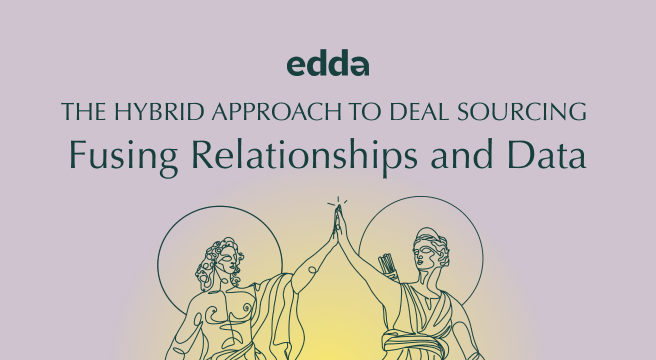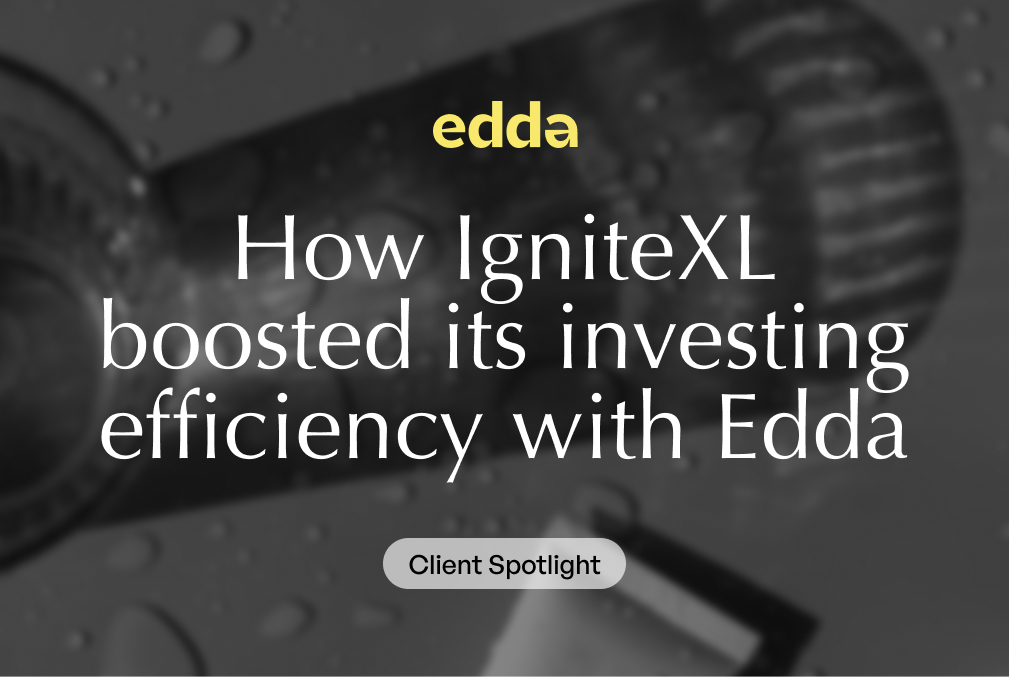In the realm of venture capital (VC), the path towards identifying and securing the most promising deals is undergoing a significant transformation. The hybrid approach to deal sourcing is emerging as a promising solution to this challenge, blending the traditional reliance on relationships with the power of data.
In this article, we delve into the implications of this novel approach, examining how it is reshaping the VC industry. We will explore the unique facets of the hybrid model and discuss growing industry trends, the challenges and solutions related to data management, and how VC app Edda aids venture capitalists in this transition, enhancing their deal sourcing efforts and potential for high returns.
A New Era in Deal Sourcing: Merging Relationships and Data
Historically, deal sourcing in the VC world relied primarily on personal networks. Relationships with entrepreneurs, angel investors, and other venture capitalists were, and still are, a vital source of potential deals. However, the increasingly competitive and rapidly changing nature of the VC industry necessitates a more comprehensive approach.
This is where data comes into play. By combining data-driven insights with traditional networking methods, venture capitalists can better qualify or disqualify potential investments, leading to more informed decision-making.
Benefits and Implications: Harnessing the Power of the Hybrid Approach
The hybrid approach in venture capital (VC) combines traditional VC practices with new methodologies, aiming to enhance results for all parties in the VC ecosystem, including venture capitalists, startups, and stakeholders. The model has three main manifestations: corporate venture capital (CVC), hybrid funds, and the venture client model.
Corporate Venture Capital (CVC): CVC, as a part of the hybrid approach, allows corporations to invest in ventures to acquire early insight into emerging industry trends and technologies and identify potential M&A targets. CVC programs fuse relationship intelligence with data by leveraging their parent company’s networks, industry knowledge, and existing customer relationships.
This integration provides insights into emerging industry trends and potential investment opportunities. Furthermore, CVCs can facilitate startups’ access to their parent companies’ resources, like marketing and development support. In this regard, relationship intelligence aids in bridging the gap between startups and large corporations, and data from these relationships can fuel better investment decisions.
Hybrid Funds: These funds integrate data-driven investment strategies of hedge funds with the longer-term perspective and close investor-company relationships typical of VC and private equity funds. This results in a more fluid structure that grants investors key benefits, such as offering liquidity under certain scenarios and locking in capital to match the investment horizon for less liquid investments. The data collected from diverse investment activities aids in making informed decisions, while the relationships fostered can lead to better opportunities and support for portfolio companies.
Venture Client Model: This model is fundamentally about strategic relationships between startups and corporations. It provides corporations lacking internal innovation capabilities with an opportunity to source external innovation strategically. It enables them to gain measurable competitive advantages from startups without the usual capital requirements of traditional corporate venture capital programs.
Relationship intelligence plays a crucial role in identifying startups that align with the corporation’s strategic objectives and can provide a competitive advantage. Meanwhile, the data gleaned from the engagement provides concrete metrics on the impact of the external innovation, helping to guide future investment or acquisition decisions.
This model also benefits startups by granting them high-profile reference clients, whose feedback is crucial for product improvement, and a boost in valuation from increased traction and revenues.
Therefore, the hybrid approach’s implications are manifold, merging relationship intelligence, which enables understanding and navigating complex inter-organizational relationships, with data-driven decision-making. This fusion can lead to more effective outreach, a deeper understanding of industry trends, and enhanced predictive capabilities for investment success.
Industry Trends: The Future of Venture Capital Deal Sourcing
With the advancement of technologies like artificial intelligence (AI) and the changing investment behavior, the future of deal sourcing is set to evolve further. One noticeable trend is the increasing use of AI and data analytics tools to enhance deal sourcing. Moreover, the growing inclination towards specialized and thematic investing, such as climate tech or health tech, emphasizes the utility of data analytics in identifying promising early-stage investment opportunities.
While it’s impossible to predict with certainty how deal sourcing will evolve, one thing is clear: data will play an increasingly significant role. The trend towards more data-driven investment strategies is likely to continue, as it enables venture capitalists to make more informed decisions and increases the chances of investing in companies that could potentially yield high returns.
Moreover, the evolution of technology is set to provide even more sophisticated venture capital software tools for analyzing and interpreting data. One such example is the application of machine learning algorithms to predict the future success of startups, something that was unimaginable just a few years ago.
Challenges and Solutions: Navigating the Hybrid Approach
Despite its benefits, integrating data into the traditional relationship-driven approach does pose some challenges:
Challenges
Ever-Increasing Data Volumes: As businesses recognize data as a valuable asset, they are continuously collecting and storing more of it. However, as the volume of data increases, it becomes more challenging to manage and analyze it effectively. For instance, joining very large data sets can be a slow process that uses a lot of system resources. VC firms, dealing with copious amounts of data from various sources, can find it daunting to efficiently sort through and analyze all the information they’ve collected.
Data Integration: This challenge involves retrieving data from disparate sources and merging it to create a single, unified view. Without the right technology, strategy, or mindset, this process can hinder the goals of a VC firm. It can become challenging to track investment opportunities, monitor portfolio companies, or even evaluate the performance of the firm itself.
Turning Data into Actionable Information: The mere fact that there is more data is not useful unless it can be transformed into ‘actionable data.’ It’s one thing to have access to a large volume of data, but another to be able to process and interpret this data to make informed decisions.
Solutions
Utilizing Data Intelligence Platforms: Data intelligence platforms like Edda can help mitigate these challenges by simplifying data consolidation and improving data visibility. These platforms assist in turning massive volumes of data into actionable insights, providing an effective solution to transition smoothly to a data-supported networking approach.
Adopting Smart Data Integration Platforms: To alleviate the challenges associated with data integration, firms can adopt smart data integration platforms. These platforms can automate the process of retrieving and merging data from different sources, thus saving time and human resources.
Data Management Strategy: It’s essential to understand how data integration fits into the overall data management strategy. Setting data management policies and governance structures can help navigate the complex landscape of data integration and ensure data integrity and privacy.
Enhancing Deal Sourcing with Edda
The hybrid approach to deal sourcing offers a robust, forward-thinking strategy. This is where Edda’s data intelligence software comes into play. Edda’s venture capital management software provides venture capitalists with key insights, making it easier for them to assess, track, and manage potential and existing investments:
Data Consolidation and Visibility: Edda’s venture capital software excels in consolidating data from disparate sources into a unified platform. This allows venture capitalists to quickly gain a holistic view of a startup, including its financial health, competitive positioning, and market trends. It also provides a historical perspective of the company’s growth, which is essential for evaluating its potential and identifying any red flags.
Actionable Insights: The software not only collects and consolidates data but also processes and interprets it, transforming raw data into actionable insights. These insights can support venture capitalists in making data-informed decisions, enhancing the likelihood of investing in startups that could yield high returns.
Intelligent Filtering: Amidst the vast sea of startups, identifying the ones that align with a firm’s investment strategy can be a daunting task. Edda’s software aids in this process through intelligent filtering, helping venture capitalists to pinpoint startups that fit their investment criteria.
Relationship Management: Recognizing the importance of relationship intelligence in venture capital, Edda’s software also offers features to track and manage relationships with entrepreneurs, investors, and other stakeholders. This can help venture capitalists nurture important relationships, enhancing their deal-sourcing efforts.
Portfolio Management: Edda’s venture capital portfolio management software is also beneficial for monitoring the performance of portfolio companies. It provides real-time updates on key performance indicators (KPIs), enabling venture capitalists to stay on top of their investments and take timely action when necessary.
In conclusion, Edda (formerly Kushim) is well-equipped to help venture capitalists transition to a more data-informed approach while maintaining the importance of relationships. By leveraging Edda’s tools, venture capitalists can maximize the benefits of the hybrid approach, ultimately enhancing their deal-sourcing efforts and increasing their potential for high returns.









